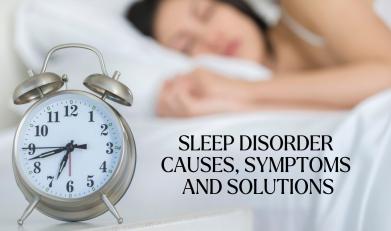

16 Jul, 2024
Sleep is a fundamental aspect of our well-being, yet many individuals struggle with getting a good night's rest. Sleep disorders affect millions of people worldwide, impacting their health, productivity, and overall quality of life. In this blog, we'll explore the various types of sleep disorders, their causes, symptoms, and potential solutions to help you achieve better sleep.
Insomnia: Insomnia is the most common sleep disorder, characterized by difficulty falling asleep, staying asleep, or waking up too early and not being able to return to sleep. It can be acute (short-term) or chronic (long-term).
Sleep Apnea: Sleep apnea is a serious disorder where breathing repeatedly stops and starts during sleep. The most common type, obstructive sleep apnea, occurs when the throat muscles intermittently relax and block the airway.
Restless Legs Syndrome (RLS): Restless legs syndrome is a neurological disorder characterized by an uncontrollable urge to move the legs, usually due to uncomfortable sensations. It typically occurs in the evening or nighttime hours when sitting or lying down.
Narcolepsy: Narcolepsy is a chronic sleep disorder characterized by overwhelming daytime drowsiness and sudden attacks of sleep. People with narcolepsy often find it difficult to stay awake for long periods, regardless of the circumstances.
Circadian Rhythm Disorders: These disorders occur when there is a misalignment between the body’s internal clock and the external environment. Examples include jet lag and shift work disorder.
Several factors can contribute to the development of sleep disorders, including:
tress and Anxiety: Mental health issues can significantly impact sleep quality.
Medical Conditions: Chronic pain, asthma, or heart disease can interfere with sleep.
Lifestyle Choices: Irregular sleep schedules, poor sleep hygiene, and substance use (caffeine, nicotine, alcohol) can disrupt sleep patterns.
Genetics: Some sleep disorders, such as narcolepsy, have a genetic component.
Medications: Certain medications can interfere with sleep.
The symptoms of sleep disorders vary depending on the specific condition but can include:
Difficulty falling asleep or staying asleep
Daytime fatigue and sleepiness
Loud snoring or gasping for air during sleep
Uncomfortable sensations in the legs
Sudden muscle weakness or loss of muscle control
Irregular sleep patterns
Establish a Regular Sleep Schedule: Going to bed and waking up at the same time every day helps regulate your internal clock and can improve sleep quality.
Create a Relaxing Bedtime Routine: Engage in calming activities before bed, such as reading, taking a warm bath, or practicing mindfulness meditation.
Improve Sleep Environment: Ensure your bedroom is conducive to sleep by keeping it dark, quiet, and cool. Invest in a comfortable mattress and pillows.
Limit Stimulants: Avoid caffeine, nicotine, and heavy meals close to bedtime. Limit screen time before bed, as the blue light from devices can interfere with your sleep cycle.
Seek Professional Help: If lifestyle changes and home remedies are not effective, consult a healthcare provider. They may recommend cognitive-behavioral therapy for insomnia (CBT-I), medication, or other treatments tailored to your specific condition.
Consider Sleep Aids and Devices: For some disorders, such as sleep apnea, using a Continuous Positive Airway Pressure (CPAP) machine can be life-changing. Over-the-counter sleep aids or supplements, like melatonin, may also be helpful for short-term use.
Sleep disorders can significantly impact your health and quality of life, but understanding the causes and symptoms is the first step toward finding a solution. By making lifestyle changes, improving your sleep environment, and seeking professional help when necessary, you can work towards achieving better sleep and overall well-being. If you suspect you have a sleep disorder, don't hesitate to reach out to a healthcare professional for guidance and support.